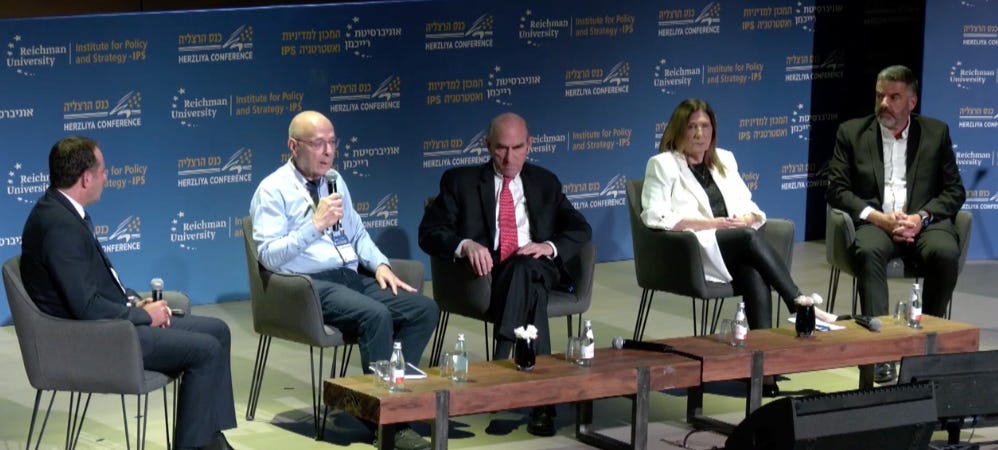Day 264 OF THE WAR: War to End by March 2025, Quiet North, Gallant in Washington, Herzliya Conference Ends With Note of Optimism
Tel Aviv Diary, June 26, 2024
ZOOM BRIEFING Sunday, June 30th, 6 PM Israel, 4 PM GB, 11 AM EDT 8 AM PDT
We now have an indication of when the war might end. Prime Minister Netanyahu’s lawyer informed the court hearing his corruption case that, due to the war, Netanyahu will not be able to testify until March 2025. It’s worth noting that when the Israeli Supreme Court was asked to determine whether Netanyahu could serve as Prime Minister while on trial, Netanyahu assured the court that he could manage both simultaneously. The prosecution’s case against Netanyahu will conclude in a few weeks, and then the defense’s case is supposed to commence. Netanyahu is scheduled to be the first witness for the defense.
SUPREME COURT RULES ON ULTRA-ORTHODOX DRAFT
The impact of yesterday’s Supreme Court ruling continues to reverberate. Last night, Rabbi Moshe Maya, a senior member of the Shas Council of Torah Sages, expressed his firm stand against drafting yeshiva students into the IDF. Rabbi Maya stated that even those not engaged in Torah study must not enlist in the Army—despite having no alternative framework—to prevent their exposure to a secular environment. He added enlisting a young man in the Army is a violation of religious law, and is equated to forced assimilation, claiming, "One who causes another to sin is worse than one who kills him.” He emphasized that there will be no agreement regarding enlistment targets and that no compromises on this matter are acceptable. Rabbi Maya even declared his willingness to resign from the Council of Torah Sages if necessary to uphold his principles.
The political repercussions of the Supreme Court's ruling on the ultra-Orthodox military draft remain uncertain, and could remain unclear for some time. However, what has become evident today is that it is highly unlikely that a new draft law will be passed in this Knesset session. MK Yuli Edelstein has firmly stated that he will not allow a law to pass the Foreign Affairs and Security Committee, which he chairs, without broad support — a prospect that currently seems unattainable.
Today, Edelstein blocked the Army’s request to extend the age of exemption from reserve duty by one year, citing insufficient information provided by the Army. Despite meeting with him twice in the last two days, Netanyahu has been unable to sway Edelstein. This all means that without new legislation, the Army will be forced to draft an increasing number of ultra-Orthodox individuals, and their funding will be discontinued. The critical question now is: How long will the ultra-Orthodox parties remain in the government under these circumstances?
HERZOG IN THE NORTH
President Herzog toured the North both yesterday and today. At the conclusion of his tour, the President said, “The international community should not be surprised if the situation goes out of control; they are not contributing anything to Israel’s security.
”
THE NORTH
Meanwhile, today was another notably quiet day on the Northern border, with just one barrage of anti-tank missiles fired at Israel. It’s not clear why Hezbollah has significantly cut back its attacks. Are they taking the threat of an Israeli attack seriously? Are they facing internal pushback in Lebanon? It’s hard to know. However, following her visit to Lebanon yesterday, the German Foreign Minister instructed all German nationals to leave the country. This raises many questions without any answers.
GALLANT IN WASHINGTON, DC
Defense Minister Yoav Gallant has had a busy three days in Washington. He met with US Secretary of Defense Austin, US Secretary of State Blinken, US National Security Advisor Sullivan, US presidential advisor Hochstein, US Presidential Advisor McGurk, and US CIA Director Burns. Gallant also held discussions with Congressional leadership. Today, before he met with Sullivan, Gallant took a jab at Netanyahu (for his video the PM released criticizing President Biden). Gallant said, “We all want the same thing, and when there are differences in approach, we settle them quietly.” Netanyahu's office promptly countered, asserting, "when you cannot settle something quietly, you have to go public.”
Gallant’s trip appears to have been successful, and at the conclusion of his meeting with Sullivan, he said:
During the meetings, we made significant progress, obstacles were removed, and bottlenecks were addressed” regarding several issues, including the supply of munitions. I would like to thank the US administration and the American public for their enduring support for the State of Israel.
THE Herzliya Conference—SECURITY SUMMIT/Day II
The first session I attended on the second day focused on the current status of Iran. The panel included:
• Maj. Gen. Amikam Norkin, Former Commander of the Israeli Air Force (IAF)
Sima Shine, Head of the Iran and the Shia Axis Program, Institute For National Security Studies (INSS).
Gideon Frank, Former Head of the Israel Atomic Energy Commission; Chairman of the Council, Technion.
Elliott Abrams, Former Deputy Assistant to the U.S. President for Middle East Policy & Deputy National Security Adviser; Senior fellow for Middle Eastern Studies (CFR), Washington, D.C.
Moderated by: Udi Segal, Chief Political Correspondent & Anchor, Channel 13 News; Sammy Ofer School of Communications, Reichman University
Norkin said that now that Iran has directly attacked Israel, there is no going back. The Iranians consider their April 13 attack on us a success, whereas we deemed it was a failure because we successfully thwarted it.
Frank stated, “Iran is on the verge of having nuclear weapons. They have material for 5-7 bombs. It will not take them years; they can have nuclear weapons within months.”
On the question of whether Iran would take the next step and actually produce weapons, Shine posited that Iran would first evaluate if their current military capabilities—excluding nuclear weapons—are sufficient. They will reflect upon this past war and might conclude that their proxies were inadequate to deter Israel from attacking Hamas. Furthermore, Shine suggested that Israel’s effective counterattack, which she hinted was very effective in striking a target the Iranians believed to be secure, could influence their decision to pursue nuclear weapons. Shine also noted that possessing nuclear weapons could enhance Iran’s conventional military power. Additionally, Shine contended Iran feels it is part of a winning alliance and that the ambitions of the Supreme Leader regarding his legacy will be another significant factor. In sum, Shine believes Iran has decided to pursue nuclear weapons.
Abrams criticized the US for allowing the Houthis to cut off global shipping without doing much. He expressed uncertainty about what the US is going to do with Iran. Abrams went on to say, “If I were sitting in Iran, I would say I had a terrific decade.”
Frank said that the best way to contain Iran is the regional alliance—as the US has suggested. When asked— What will happen if the Iranians get nuclear weapons? Frank asserted he did not know.
Shine said Iran hopes that we will disappear, and they see what happened in the last eight months as the first step. Shine said, “We need to think about what we are doing. Killing five more Hamas fighters is not worth it if we are not working to stop Iran from getting the bomb.”
In conclusion, Abrams said,
Having a massive number of nuclear weapons did not save the USSR; they collapsed internally. The Iranian regime is very unpopular, and we are not doing anything to bring it down. That is what we should be working on. We should not assume that the regime is eternal; otherwise, it will be.
In my opinion, Abrams’ closing statement is the most significant one, and that should be our focal point.
The next session I found interesting was titled: “The Global Order: Is the World Changing Course?” This panel included:
Hon. Roderich Kiesewetter, Member of the the Foreign Affairs Committee, The German Parliament (Bundestag)
Antonia Dimou, Director, Middle East and Persian Gulf Unit, Institute for Security and Defense Analysis, Greece
Prof. Dmitry (Dima) Adamsky, Head of the Honors Track in Strategy, Lauder School of Government, Diplomacy and Strategy, Reichman University
Moderator: Shashank Joshi, Defense Editor for The Economist
This discussion offered interesting perspectives that I don’t often encounter. The main takeaway is that Europe has undergone dramatic changes in terms of defense, and is now planning how to achieve independence from the US should Trump be reelected.
The next engaging session addressed “National Security Challenges Tested by Evolving Threats.” This lecture featured:
• Brig Gen. (res.) Aviv Tamir, Head of Israel, Strategic Unit, Israel Aerospace Industries
Tamir stated that in 1967, we considered the closing of the Straits of Tiran as a cause for war. Now, for eight months, the port of Eilat has been closed due to the Houthis, and we have not made any significant response. He went on to say that in 1973, the Arab armies greatly outnumbered us. Despite our initial surprise, after three weeks, Israel had effectively wiped out the enemy. In contrast, after eight months of the current conflict, we have destroyed 40% of Hamas, which constitutes approximately 7% of all our enemies. Tamir expressed concern over the situation, which is not good; our enemies smell blood. According to Tamir, we can deal with all of our enemies, but to do so, we must first get out of Gaza and reorganize the Army.
Another intriguing session was titled “Israel Without the US: Is it Possible?” The discussion included the following panelists:
Dr. Victoria Coates, Former Deputy National Security Advisor to the U.S. President;
Vice President, Kathryn and Shelby Cullom Davis Institute for National Security and Foreign Policy, The Heritage Foundation
Lt. Gen. (res.) Moshe (Bogie) Yaalon, Former Minister of Defense; The 17th IDF Chief of General Staff
David Makovsky, Director, Koret Project on Arab-Israel Relations, Washington Institute for Near East Policy, U.S.
Prof. Yossi Shain, Professor Emeritus, Tel Aviv University; Georgetown University, Washington D.C.; Assistant to the President and a Representative of Brandeis University in Israel
Moderator: Gil Tamary, Chief International News Editor and Commentator,
Channel 13 News
The discussion was initially framed around statements from certain members of the current Israeli government asserting that Israel is capable of “going it alone.” However, no one on the panel agreed with that view. Moreover, all the panel members thought that statement was ridiculous. Additionally, the panelists concurred that recent statements by Netanyahu have not been helpful. The panel was divided on whether Trump would be better for Israel, with former Trump advisor Dr. Coates believing so, while others were less convinced. Nonetheless, all acknowledged that even if Trump were to win—an outcome they deemed a toss-up, at best— he wouldn’t take office for another six months.
(Paid subscribers get to read the good news from the conference below)
Keep reading with a 7-day free trial
Subscribe to Tel Aviv Diary to keep reading this post and get 7 days of free access to the full post archives.





